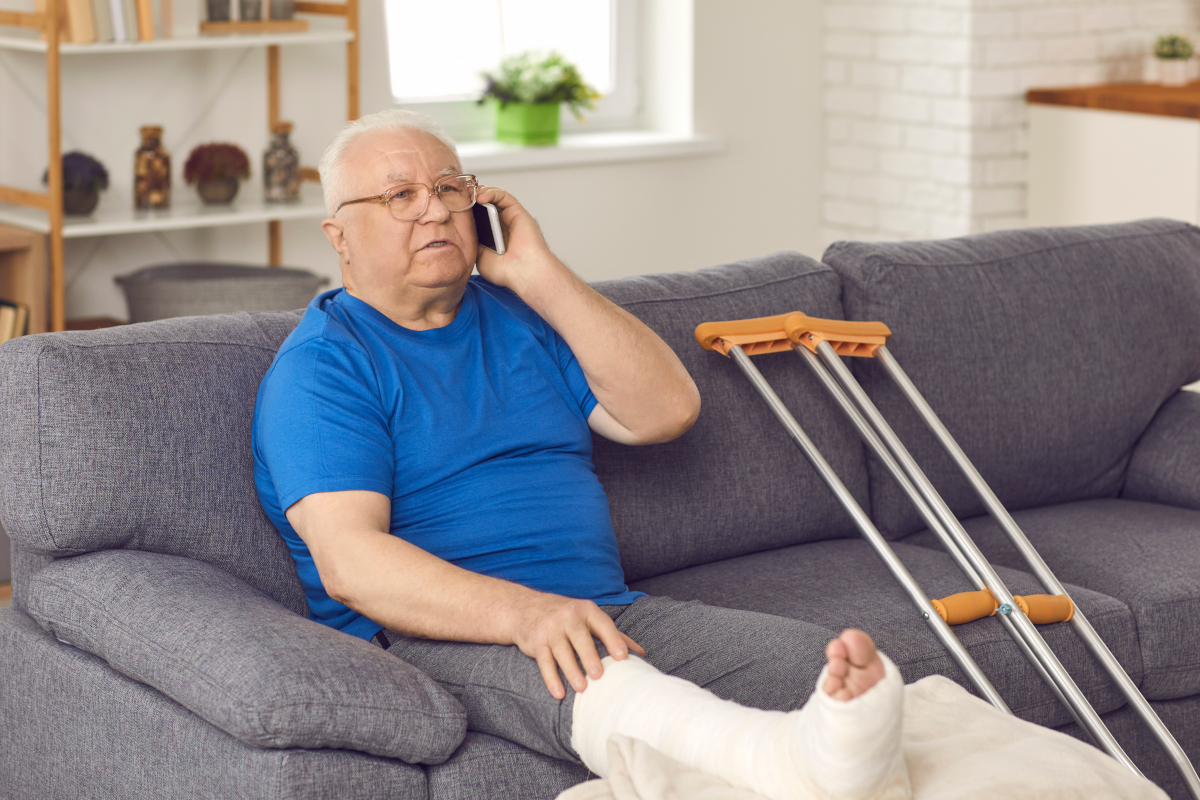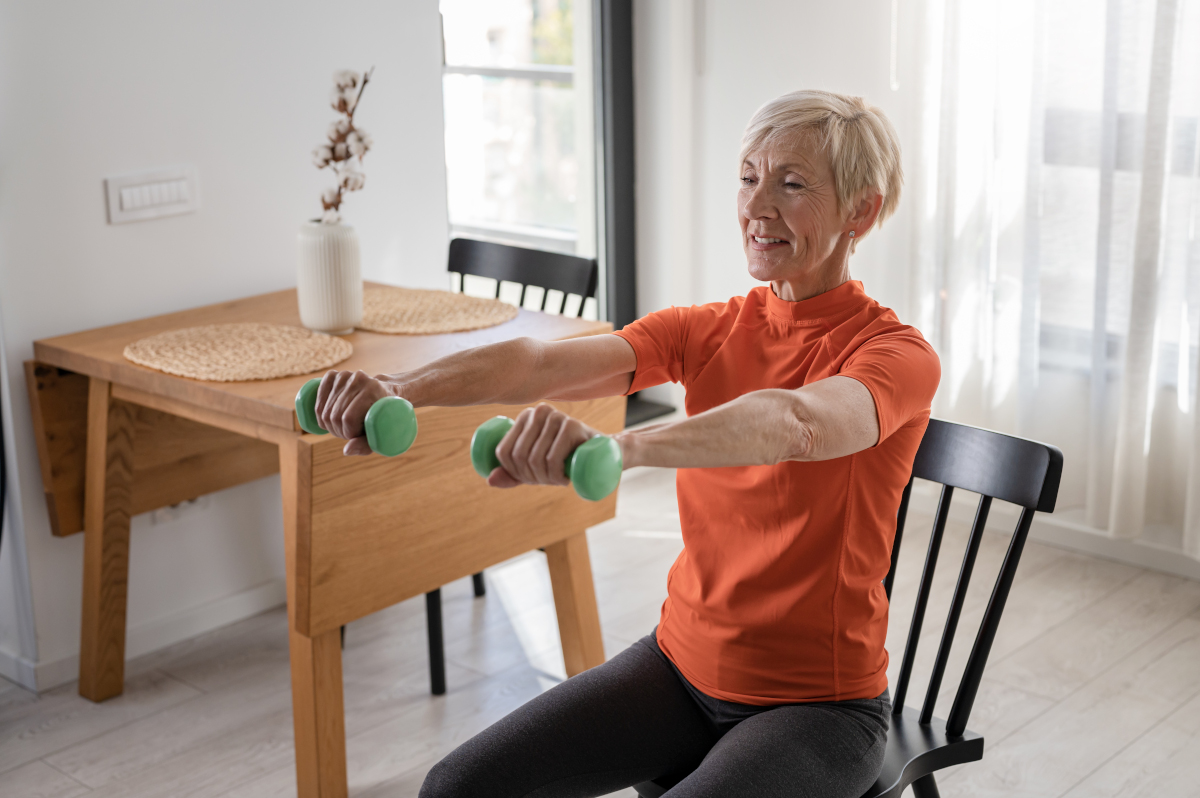Senior bone health is a very important topic. We often forget that our bones are more than a support structure. They are made of living tissue that goes through changes just like the rest of our bodies.
Bones in a healthy person are constantly broken down and replaced. Old tissue is replaced with new to keep us strong.
The inside of a human bone looks like a honeycomb with small openings surrounded by a wall. Someone with osteoporosis will have bigger gaps in their bone tissue. This condition also causes the rate of bone loss to increase and begin to surpass the body’s ability to replace what’s broken down.
Those with osteoporosis have brittle bones that are more likely to fracture. Some cases can be so severe that a minor movement like a light bump or cough can cause a break. Recovery time also increases, and some patients experience chronic pain.
Elderly people who do not have osteoporosis should still be mindful of their bone health. The older we get, the more susceptible we are to injury and longer recovery times. The Journal of Clinical Endocrinology & Metabolism published a study that found a broken bone injury in a senior citizen can increase their death risk for as long as a decade after the incident. It can also lead to other health complications that affect longevity and quality of life.
Healthy bones start with a healthy lifestyle. It’s also important to ask: what can seniors do to lower their fall risk? Staying safe can help you prevent an injury before it can affect your long-term health.
What can people over age 65 do now to keep their bones strong?
Avoid Alcohol and Nicotine
It is no secret that alcohol and nicotine are bad for health. Those who smoke cigarettes hinder their body’s ability to absorb calcium. Inadequate calcium leads to lower bone density. It also slows the production of cells that form bone tissue. Smokers who break a bone tend to require more time to heal compared to non-smokers.
Smoking breaks down estrogen. Estrogen is needed to regulate bone metabolism.
Alcohol is also detrimental to bone health. Heavy consumption decreases bone density and increases the risk of osteoporosis.
Having an occasional alcoholic beverage isn’t necessarily going to impact your bones, but excessive drinking will.
Include Protein and Calcium in Your Diet
Calcium is essential to the wellness of your bones. The human body builds a framework of collagen. Tiny crystals of calcium spread across the framework through the blood. They fill in the spaces to build new bone tissue.
Without calcium, this process wouldn’t work as it is supposed to, leading to weak bones. Calcium is also essential when healing from scrapes and cuts. Every cell in your body needs it, so make sure you are getting enough in your daily diet.
The National Institutes of Health recommend that men age 51 to 70 should get 1,000 mg of calcium per day while women in this age group should get 1,200 mgs. All adults over age 70 should get 1,200 mgs daily.
Protein is also essential to bone health. Protein improves muscle mass and calcium absorption. Adults over age 65 should get between 0.45 and 0.55 grams of protein per pound of body weight each day.
Seniors in a Scottsdale assisted living community gain the benefit of healthy meals prepared daily. Having a professional handle dietary needs can take some of the guesswork out of managing your protein and calcium intake.
Maintain a Healthy Body Weight
Maintaining a healthy body weight will do wonders for your overall health – especially your bones. People who are underweight have a greater risk of low bone density due to malnutrition. A lack of the necessary vitamins and minerals can deteriorate bone tissue.
Obesity also has a negative impact. Extra weight puts more pressure on bone structure, which can increase a person’s fracture risk. Some research has indicated that being overweight inhibits the creation of new bone tissue. Chemical messengers are disrupted, which interferes with your body’s ability to regulate bone strength.
The Arthritis & Rheumatology journal reported that people who are overweight have twice the risk of osteoarthritis compared to those who are a healthy weight.
Perform Weight-Bearing Exercises
Exercise is highly recommended for general health and wellbeing. Performing just 30 minutes per day can improve your bone health. For best results, include weight-bearing movements to strengthen bones. Some common senior-friendly weight-bearing workouts include:
- Walking
- Jogging
- Tennis
- Impact aerobics
- Stair climbing
- Tai chi
- Yoga
Which works best for you will depend on your mobility and ability level. You can also look for activities that may include weight-bearing exercises, like gardening. Many of these movements focus on the hips, lower spine, and legs which are common problem areas for older adults.
Exercise is also great for the rest of your body. It gets the blood flowing and stretches muscles. Create a well-rounded workout routine with the help of a senior citizen’s guide to a healthy heart.
Stay in Touch with Your Doctor
Your doctor can guide you to a healthier future at any age. They can also recommend ways to deal with existing issues or prevent future problems. Talk to your doctor about whether it’s time for an osteoporosis screening.
It’s never too late to improve your bone health. Schedule an appointment with a medical professional and make positive changes to protect your wellness and mobility as you age.




